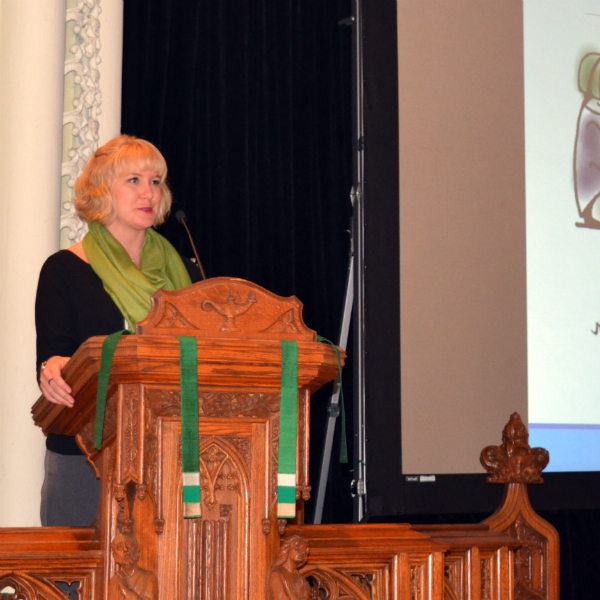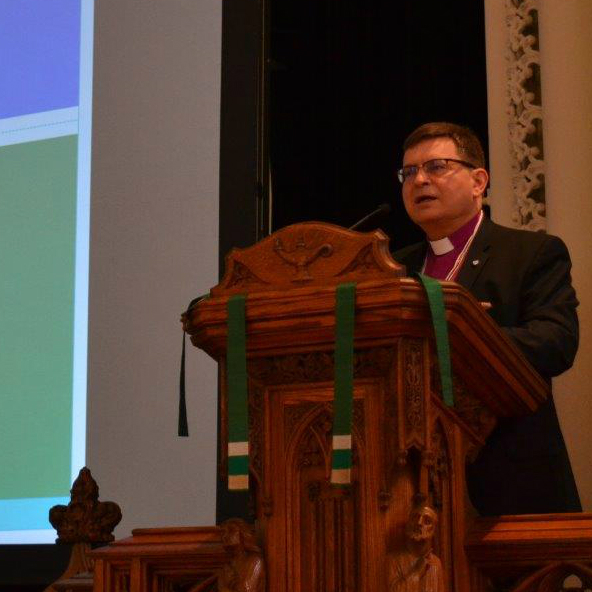Synod Looks Back, Looks Around, and Looks Forward
Governing body meets at Christ’s Church Cathedral in Hamilton
Posted November 18, 2017
 Over the course of two days in November, the Synod of the Diocese of Niagara met at Christ’s Church Cathedral in Hamilton and was guided by a reflective theme that invited members to look back on the Bishop’s 10 years of episcopal ministry, look around at the synod’s current context, and look forward to where God is inviting the diocese next.
Over the course of two days in November, the Synod of the Diocese of Niagara met at Christ’s Church Cathedral in Hamilton and was guided by a reflective theme that invited members to look back on the Bishop’s 10 years of episcopal ministry, look around at the synod’s current context, and look forward to where God is inviting the diocese next.
Bishop Michael Bird’s final charge reflected on the sacred calling and prophetic work to which God calls us as disciples. It also named and celebrated the many ways the diocesan vision has taken off since its initial conceptualization several years ago. The charge was capped off by words of gratitude and prayers of thanksgiving. “Let us give thanks to God for this remarkable journey that we have taken together; one that has changed our lives and has renewed and transformed us as God's people in Niagara.”
 As synod’s focus shifted to look around at the current context, healing and reconciliation between Indigenous and non-indigenous peoples and communities featured prominently. Melanie Delva, the Anglican Church of Canada’s reconciliation animator, invited members of synod to engage deeply with the Calls to Action of the Truth and Reconciliation Commission. “I believe reconciliation to be a spiritual practice,” she said. In addition, Esther Wesley highlighted the important work of the Anglican Healing Fund while Archdeacon Val Kerr reflected on her participation at the recent National Consultation on Indigenous Anglican Self-Determination: The Road to Warm Springs.
As synod’s focus shifted to look around at the current context, healing and reconciliation between Indigenous and non-indigenous peoples and communities featured prominently. Melanie Delva, the Anglican Church of Canada’s reconciliation animator, invited members of synod to engage deeply with the Calls to Action of the Truth and Reconciliation Commission. “I believe reconciliation to be a spiritual practice,” she said. In addition, Esther Wesley highlighted the important work of the Anglican Healing Fund while Archdeacon Val Kerr reflected on her participation at the recent National Consultation on Indigenous Anglican Self-Determination: The Road to Warm Springs.
On Friday, synod members also approved two significant motions; one to adopt a simpler and fairer formula for calculating the diocesan mission and ministry assessment, and another amend Canon 2.1 to remove gendered language requirements in the nomination process of episcopal elections.
Shifting to the future, a presentation on human trafficking sought to raise awareness about the all-to-often hidden issue that is a real concern not only globally but locally as well. Complementing this, the diocesan delegation to the United Nations Commission on the Status of Women also gave a report. “The opportunity to participate at the UNCSW has been incredibly transformative and empowering and challenging,” said Sierra Robertson-Roper.
A report by the Bishop’s Property Task Force was also presented. “Property shouldn’t own us,” proclaimed Archdeacon David Anderson, who went on to say that they are “meant to proclaim the Good News to all.” Synod also learned about the diocesan process for further engagement on amendments to the Marriage Canon in advance of General Synod in 2019. Canon Christyn Perkons noted that we are “uniquely positioned to share the voices and  perspectives” of those who have been able to participate in the sacrament of marriage as a result of Bishop Bird’s pastoral provision for equal marriage.
perspectives” of those who have been able to participate in the sacrament of marriage as a result of Bishop Bird’s pastoral provision for equal marriage.
Preparing for March’s episcopal election, Archbishop Colin Johnson, metropolitan of the Ecclesiastical Province of Ontario, led members of synod through an exercise designed to help them reflect upon the nature of episcopal ministry and the qualities and characteristics they value in a bishop.
After passing the 2018 diocesan budget, synod concluded by passing a motion to express its “deepest thanks” for the ministry of Bishop Michael Bird.